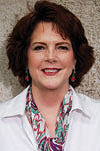Sedgwick County health director Adrienne Byrne is urging residents to get their third and in some cases fourth COVID-19 vaccine shots, known as “booster” shots.
“We haven’t given that many booster shots for the amount of people that have been fully vaccinated,” Byrne said.
“At first, we had a lot of people coming for booster doses, then it just really began to slow down,” she added.
As of Wednesday, according to the county health department, 109,917 people have received a booster shot. That’s estimated to be about 40 percent of the people eligible for a booster shot. Nationally, the CDC estimates that 42.4 percent of people eligible for a booster shot have received one.
The CDC recommends a booster shot for people over a certain age — 12 and up for those who’ve received the Pfizer vaccine and 18 and up for those who’ve received the Moderna or Johnson & Johnson vaccines. The recommended waiting period before getting a booster is five months for those receiving the Pfizer and Moderna vaccines and two months for those receiving Johnson & Johnson’s.
The CDC recommends a fourth shot for people whose immune systems are severely compromised. That includes people who have cancer or who are taking cancer treatment drugs, people who’ve had organ transplants, people who have autoimmune disorders or who are taking immune suppressive drugs, and people with advanced HIV.
For people with these conditions, Byrne said, “That fourth shot is their booster to boost their immune system because research shows the vaccine is waning over time. The booster provides that effectiveness.”
People don’t need a doctor’s order to receive the fourth shot, Byrne said. The Sedgwick County Health Department is administering fourth doses at its Community Vaccine Clinic at 223 S. Main and at Mobile Vaccine Clinics located around the county. There is no charge for the shots. For a list of upcoming mobile clinics, visit https://www.sedgwickcounty.org/covid-19/vaccine/clinic-locations/.
In-car vaccination is available at the Community Vaccine Clinic for those people who do not wish to enter the clinic. To receive this service, park in a designated disabled parking space in the south lot adjacent to 223 S. Main and dial 316-660-0960.
Bryne acknowledged that vaccine guidelines have seemed “complicated” to many. For instance, she’s been asked if people with COPD or diabetes need a fourth dose. They do not, she said.
Byrne believes a couple factors are responsible for people not getting their booster shots. They may have had a bad reaction to their second shot. “Not everybody has paid sick leave, and you can feel pretty bad for 24 hours,” she said.
“Another reason is because they think COVID is gone, things are back to regular and you don’t have to wear a mask. Those things just aren’t true.”
In one population segment whose vaccination status is being closely tracked — nursing home residents — 88.7 percent of those in Kansas had been fully vaccinated, while 57.1 percent had received a booster as of Jan. 20, according to AARP. The percentage of fully vaccinated staff who’d received a booster was only 20.8 percent.
Byrne reached out to The Active Age to deliver her message but emphasized that it isn’t intended just for older residents.
“It’s important that their family members are fully vaccinated and boosted because they’re going to be around,” she said.
Byrne addressed several more COVID-related developments, including:
- The waiting period for booster shots for people who are immunocompromised. The CDC is expected to shorten the waiting period and when it does, Kansas and local authorities will follow the new guidelines, Byrne said.
- A March 15 federal deadline for nursing home employees and other health care workers to be vaccinated. According to the CDC, 79.2 percent of Kansas nursing home employees are now vaccinated. The nursing home industry has warned that the mandate may harm residents by further reducing staffing in the homes, which has already been stretched thin. “It is concerning because we know that nursing homes do struggle with finding staff,” Byrne said. “At the same time, the residents in the homes are at such high risk.”
- A report by researchers at Johns Hopkins University suggesting that lockdowns had not been effective in reducing mortality in Europe and the United States.
Byrne said it was difficult for authorities to know the “right response” in the early days of the pandemic, calling lockdown orders “the lesser of two evils.”
“We know a lot of people suffered because of those lockdowns. But in regards to masks and gathering orders, absolutely they were important.”
Contact Joe Stumpe at joe@theactiveage.com.












